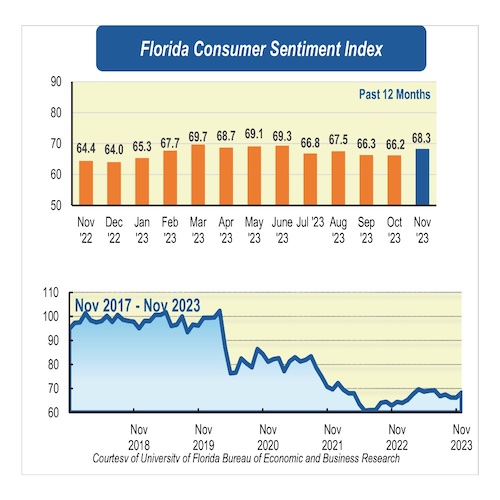
Floridian sentiment increases as perceptions of economic conditions improve
Consumer sentiment among Floridians increased in November to 68.3, up 1.9 points from a revised figure of 66.4 in October. On the contrary, national sentiment decreased over two points.
“This marks the second consecutive monthly increase in consumer sentiment, following October’s revised figures. While optimism in November was primarily driven by opinions regarding current economic conditions, expectations about future outlooks, particularly over the next 12 months, also played a significant role. Importantly, these consumer expectations are likely to boost consumer spending during the holiday season and contribute to the ongoing economic momentum as the year ends,” said Hector H. Sandoval, director of the Economic Analysis Program at UF’s Bureau of Economic and Business Research.
All five components that make up the index increased.
Floridians’ opinions about current economic conditions improved in November. Perceptions of personal financial situations now compared with a year ago increased 3.1 points from 54.2 to 57.3, the greatest increase of any reading this month. Opinions as to whether now is a good time to buy a major household item, such as an appliance, increased by 2.2 points from 56.9 to 59.1. These positive views were generally shared by Floridians across sociodemographic groups, except for people 60 and older, who reported less-favorable views to both components. Additionally, men and people with an annual income under $50,000 reported less-favorable views to the latter component.
Likewise, outlooks about expected economic conditions were also positive. Expectations of personal finances a year from now increased 2 points from 83.7 to 85.7; however, men and people younger than 60 reported more pessimistic views. Expectations about U.S. economic conditions over the next year increased 1.2 points from 64.8 to 66. Similarly, views on U.S. economic conditions over the next five years saw a slight increase of seven-tenths of a point, from 72.7 to 73.4. Nevertheless, sentiments about the country’s economy were divided among sociodemographic groups, with men and people 60 and older expressing less-favorable opinions to both components. Additionally, people with an annual income under $50,000 expressed less-favorable views to the former.
Economic activity in Florida remained positive, with the economy adding more jobs statewide. The unemployment rate in Florida held steady at 2.8% in October, while the national increased slightly to 3.9%. Moreover, inflation continued to slow down, reaching a 3.2% annual rate. Although inflation is still above the central bank’s 2% target, the Fed held interest rates steady for the second consecutive time in their last meeting at the beginning of November.
“While more evidence of cooling inflation is needed for the Fed to conclude the historic tightening cycle that has led interest rates to a 22-year high, the current pause is undoubtedly welcome and contributes to a positive economic outlook,” said Sandoval.
“As the year draws to a close, we anticipate a modest improvement in consumer sentiment, in view of the inflation outlook and the resilience of the labor market,” said Sandoval.
Conducted October 1 through November 20, the UF study reflects the responses of 219 individuals who were reached on cellphones and 252 individuals reached through an online panel, a total of 471 individuals, representing a demographic cross section of Florida. The index used by UF researchers is benchmarked to 1966, which means a value of 100 represents the same level of confidence for that year. The lowest index possible is a 2, the highest is 150.
Details of this month’s survey can be found at https://www.bebr.ufl.edu/florida-consumer-sentiment/.
